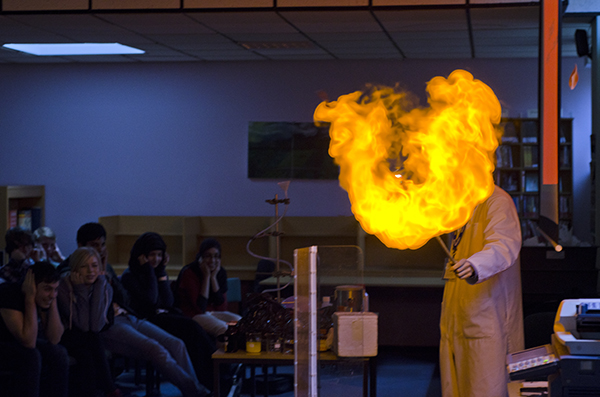Stories
 Chemistry Outreach
Chemistry Outreach
Benefactors Update 2014
Chemistry Outreach is the name for our programme with primary and secondary schools, and it’s all about getting children and young people interested in science, building their confidence, allowing them to make informed decisions about their futures.We host visits to campus and visit schools, running different experiments with different age groups in the teaching laboratories in the Chemistry Department and our visitors receive tuition and guidance from academic staff and graduate students. Within no time at all, we see school pupils from all backgrounds managing to do really technical, complicated things with skill and confidence.
By the end of a day with us, eight-year-olds tend to be buzzing and covered in food colouring, wanting to take the slime they have made home with them. Fourteen-year-olds try not to look as proud as they feel at having removed caffeine from tea, and older students can see, first hand, that Chemistry is an important subject that makes the world better.
Putting people out of their comfort zones, making them face a really technically challenging task and struggle with it for a while before succeeding is such a healthy experience for anyone. It often leaves people thinking better of themselves and their abilities.
In this context, Chemistry is just a vehicle for something more. Nearly 1200 children worked for a day in our labs last year and I have often been privileged to see some wonderful things: children realising they’re good at science after all, the PhD student who saw a future as a teacher, and teachers who feel reinvigorated and proud. I think it works just as well in both directions: the academic staff members enjoy working with children too and many of them are very good at it indeed.
Small sums of money help us to do one-off, bespoke activities with young people. They can pay for food and drink, so that young people can experience the formality of giving a presentation and eating with "important people" or it can pay for travel so that we can take young scientists to see places and meet people that they would never have even known existed in places they have never seen, such as London, for example.
Your donations help us to bring young people to a truer realisation of their abilities and of the beauty and relevance of science. Thank you!
Nick Barker
Senior Teaching Fellow
